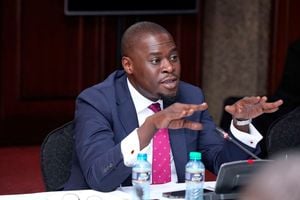
The Nairobi City Water and Sewerage Company Limited.
After the incorporation of the Nairobi Water and Sewerage Company in December, 2003, numerous staff from City Hall’s water and sewerage department were absorbed by the new firm.
This was a lateral transfer that would see the staffers enjoy similar terms, including pension. Much like the defunct City Hall department, Nairobi Water’s pension scheme was managed by the Local Authorities Pension Trust (Laptrust).
A staffer would contribute 12 per cent of their gross monthly salary to pension. Nairobi Water would contribute an equivalent of 15 per cent of that staffer’s salary to their pension.
In September, 2005, Nairobi Water opted to dump Laptrust in favour of Madison Insurance. What remains unclear is how the firm, fully owned by Nairobi County, resolved to lower the rate of pension contributions to 10 per cent by both employees and employer. Naturally, the lower rate meant employees would receive less pension benefits in their sunset years.
“That was that time and (we) may not know why management decided to accept that rate,” Nairobi Water managing director Nahashon Muguna told The Weekly Review via text message.
When asked about records of meetings and resolutions which could unlock the reasoning behind the lower pension rate, Mr Muguna did not respond.
But that decision has become an expensive blunder, as Nairobi Water now seeks to borrow Sh2.3 billion from a commercial bank to clean up a two-decade-old mess. In September, 2010, Nairobi Water re-hired Laptrust as its pension scheme administrator, ending a five-year relationship.
Upon returning to Laptrust, the pension contributions rate returned to 12 per cent by the employees, and 15 per cent by Nairobi Water.
All the while, disquiet over the Madison Insurance deal slowly simmered until 2012 when it reached boiling point and Nairobi Water resigned to plugging the hole dug in the five-year Madison Insurance era.
Nairobi Water commissioned an actuarial valuation to determine how much money failed to hit employees’ pension accounts between 2005 and 2010.
The tabulation came to Sh937.9 million, a massive figure at the time.
“The purpose of this actuarial valuation was to ensure members enjoy uninterrupted pensionable service,” the water firm told Nairobi County finance and planning CEC Charles Kerich in 2022 when seeking approval for the loan.
Nairobi Water agreed to make the Sh937.9 million payment to Laptrust, and the amount would garner interest at the same rate it would have attracted while in pensioner’s accounts – three per cent each month. The water firm, however, slacked on payment, and the debt has now grown to over Sh2.3 billion – more than double the principal amount owed.
Nairobi Water’s move has not gone down well with Kileleshwa MCA Robert Alai, who has now filed a complaint and a probe request with the Directorate of Criminal Investigations (DCI).
Alai alleges that there is a plan to push the loan through without approval of the County Assembly. He insists that such borrowing must be approved by the County Assembly in line with section 8 of the County Governments Act and section 142 of the Public Finance Management Act.
“According to my reliable sources, Nairobi Water and Sewerage Company has accumulated a substantial debt of Sh2.3 billion. This raises serious concerns about financial mismanagement and a lack of adherence to statutory obligations…,” Mr Alai says in his complaint to the DCI.
“Given the gravity of this matter, I urge your office to initiate a thorough investigation and take appropriate legal action against any individuals found responsible for financial mismanagement. This will not only safeguard the interests of the employees but also uphold the integrity of public financial management,” the Kileleshwa MCA adds.
He wants the investigation to unravel whether past or present officials of the water firm unlawfully contributed to the debt, if there has been any financial impropriety and how the debt interest rate was calculated.
Unlike bank loans, the debt has not been tamed by the in duplum rule, which stops the interest on debts from growing past the principal amount owed. This means that the debt will continue to grow until it is paid in full.
Feeling that the Laptrust interest rate was high, Nairobi Water opted to borrow from a commercial bank, using revenue collected from usual service provision as security. This means that if Nairobi Water defaults on the loan, the lending entity will be at liberty to attach payments made by county residents to offset the debt.
The Nairobi County Executive Committee gave a greenlight to the loan move in April, 2023 after Nairobi Water argued that it may not be able to pay the debt on account of the Laptrust interest rates.
On January 23, 2024 Attorney-General Justin Muturi also gave a go-ahead to the request following an advisory request by Nairobi Water on condition that the loan is obtained from a local bank and only after getting approval from the county government. Nairobi Governor Johnson Sakaja and his Cabinet have already okayed the planned loan, and forwarded the water firm’s request to the County Assembly for consideration.
Sakaja’s administration issued a letter of no objection to Nairobi Water through County Secretary Patrick Analo on April 16, 2024 after the firm stated that it would follow procurement laws in selecting a borrower and then channel the entire loan to paying the Laptrust debt.
On June 11, Leader of Majority Party in the County Assembly Peter Imwatok laid before the House papers containing Nairobi Water’s request. The request was forwarded to the assembly by Analo.
“Considering the county government means both the county executive and the county assembly and also considering that the county executive has given a nod for the borrowing, now this letter hereby forwards the request by NWSC for consideration by the Nairobi City County Assembly,” Analo said in a letter dated April 16.
Following debate, the assembly will decide on whether to approve or reject the request. The DCI received Mr Alai’s letter on June 5, 2024 – a week before Mr Imwatok tabled papers with the Nairobi Water request before the County Assembly.
Nairobi Water managing director Muguna has, however, defended the loan move, arguing that the firm currently pays Sh73.5 million to Laptrust daily – Sh44 million for current pension deductions and Sh30 million towards the historical debt.
“This will enable us to stop further growth of the debt occasioned by the accrued interest, clear the facility within 10 years without incurring additional strain to the company, secure the financial position of the company in the long term…,” Muguna added.
Muguna did not, however, confirm, whether Nairobi Water has records indicating how the move to Madison and the lower pension contribution rate was arrived at.
Whether the loan request is approved or not, the Sh2.3 billion bill stands as one of the ignored historical debts that continue to threaten the financial wellbeing of taxpayers and government institutions, following years of neglect.








